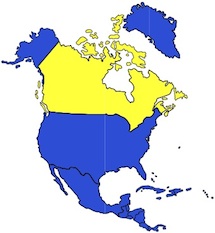By Chris Conrad, WestCoastLeaf.com
WCL News – The Canadian Association of Chiefs of Police has recommended that marijuana possession should be reduced to a citation offense that does not lead to an arrest. According to an August 20, 2013 CACP press release, its membership voted at its annual General Meeting in Winnipeg to ratify Resolution #04 – 2013 recommending that enforcement options should be expanded to increase police discretion when confronting the illicit possession of cannabis. The association represents more than 90% of the police community in Canada which include federal, First Nations, provincial, regional and municipal, transportation and military police leaders.
“The current process of sending all simple possession of cannabis cases under the Controlled Drug and Substances Act to criminal court is placing a significant burden on the entire Justice system from an economic and resource utilization perspective,” stated CACP President Chief Constable Jim Chu. “The CACP is not in support of decriminalization or legalization of cannabis in Canada. However, under current legislation the only enforcement option for police, when confronted with simple possession of cannabis, is either to turn a blind eye or lay charges. The latter ensues a lengthy and difficult process which, if proven guilty, results in a criminal conviction and criminal record.”
In Canada, 100,675 people were arrested for drug offenses in 2007, of which 62,510 were cannabis related. Of these cases, 47,101 were simply for personal possession. Statistics Canada reports that “About half of adult cases (55%) and youth cases (48%) involving drug-related charges in 2006/2007 resulted in a finding of guilt… . (The other half) are stayed, withdrawn, dismissed or discharged.” The CACP proposes adding a low-level ticket option through the Federal Contraventions Act for simple possession of cannabis and listed several major benefits:
• It expands the range of enforcement options available to more effectively and efficiently address the illicit possession of cannabis while maintaining the ability to lay formal court process charges;
• It reduces the burden on policing and judicial resources to provide significantly greater economies and efficiencies; and,
• By receiving a ticket, individuals can avoid having a criminal record which can place significant barriers on travel, obtaining employment, bonding and citizenship.
“The CACP believes the illicit use of cannabis has a negative impact on public safety and the health of young persons,” stated CACP Drug Abuse Committee Chair Chief Mark Mander. “By adding this additional policing tool, however, we are proposing a responsible public safety initiative that will be of overall benefit to all Canadians.
The Association was founded in 1905 and represents approximately 1,000 police leaders from across Canada. The Association is dedicated to the support and promotion of efficient law enforcement and to the protection and security of the people of Canada. Its vote came just days after Justin Trudeau admitted to having used cannabis while serving as a member of Parliament. Public support for Trudeau, who is campaigning to become Prime Minister, has increased since his admission.
Variations of this policy, commonly referred to as ‘decriminalization,’ are presently imposed in 16 US states, including California, Connecticut, Massachusetts, Mississippi, and Nebraska. Two US states have legalized personal possession of up to an ounce (28 grams) of cannabis.
“”Empowering the officers and trial judges on the ground to exercise their discretion sounds like a great idea,” noted journalist Jeremy Daw, author of Weed the People. “Hopefully the US Congress can learn from police chiefs to our north and end the failed policy of mandatory minimums, a principle also endorsed by Attorney General Eric Holder.”
The CACP resolution provided two examples illustrating how its proposal would work: “Two persons in a public park, one consuming alcohol and the other smoking cannabis. Consuming alcohol in a public space would result in the issuance of a ticket pursuant to provincial liquor laws. However, the only alternative to giving the cannabis-consuming subject a verbal warning would be to proceed with a formal charge pursuant to the CDSA. … As an example of where a formal charge would be the more appropriate option, consider a motorist who has been pulled over and is found to be smoking a joint.” — West Coast Leaf News Service
